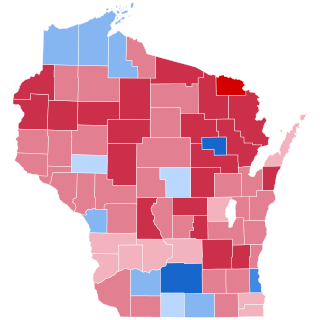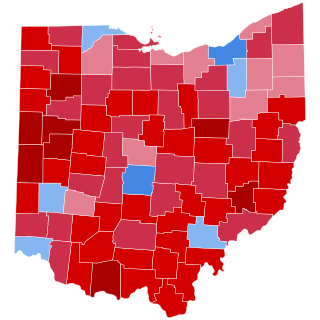Related Research Articles

The Republican Party, also known as the Grand Old Party (GOP), is one of the two major contemporary political parties in the United States. It emerged as the main political rival of the then-dominant Democratic Party in the 1850s, and the two parties have dominated American politics since then.

Youngstown State University is a public university in Youngstown, Ohio, United States. It was founded in 1908 and is the easternmost member of the University System of Ohio.

Timothy John Ryan is an American politician who served as a U.S. representative for Ohio from 2003 to 2023. A member of the Democratic Party, he represented Ohio's 13th congressional district from 2013 to 2023, having previously represented Ohio's 17th congressional district from 2003 to 2013. Ryan's district included a large swath of northeastern Ohio, from Youngstown to Akron. He was the Democratic nominee in the 2022 United States Senate election in Ohio, which he lost to JD Vance.

Presidential elections were held in the United States on November 8, 2016. The Republican ticket of businessman Donald Trump and Indiana governor Mike Pence defeated the Democratic ticket of former secretary of state and former first lady Hillary Clinton and Virginia junior senator Tim Kaine, in what was considered one of the biggest political upsets in American history. It was the fifth and most recent presidential election in which the winning candidate lost the popular vote. It was also the sixth and most recent presidential election in U.S. history in which both major party candidates were registered in the same home state.

The Youngstown State Penguins football team represents Youngstown State University in American college football. Youngstown State currently plays as a member of the NCAA at the NCAA Division I Football Championship Subdivision and are a member of the Missouri Valley Football Conference (MVFC). The Penguins have played their home games in Stambaugh Stadium, more commonly called "The Ice Castle," since 1982.
The McDonough Museum of Art is a center for contemporary art located in Youngstown, Ohio, US, on the campus of Youngstown State University (YSU). Opened in 1991 in a building designed by Gwathmey Siegel & Associates Architects, the museum focuses on contemporary art through exhibits and art education. The origins of the museum begin in 1986 through the donations and efforts of local physician and art collector John J. McDonough, who used proceeds from the sale of his painting Gloucester Harbor by Childe Hassam to fund construction. Along with the proceeds from McDonough, Attorney Paul M. Dutton and the State of Ohio assisted in the effort to finally begin construction in the fall of 1990.

William Leslie Johnson is an American university administrator, businessman, and former politician who has served as president of Youngstown State University since 2024. Previously, he was the U.S. representative for Ohio's 6th congressional district from 2011 until 2024. He is a member of the Republican Party.
This is a list of nationwide public opinion polls that were conducted relating to the Republican primaries for the 2016 United States presidential election. The persons named in the polls were either declared candidates, former candidates, or received media speculation about their possible candidacy. On May 4, 2016, Donald Trump became the sole contender and presumptive nominee.

The 2016 presidential campaign of Donald Trump was formally launched on June 16, 2015, at Trump Tower in New York City. Trump was the Republican nominee for President of the United States in the 2016 election, having won the most state primaries, caucuses, and delegates at the 2016 Republican National Convention. He chose Mike Pence, the sitting governor of Indiana, as his vice presidential running mate. On November 8, 2016, Trump and Pence were elected president and vice president of the United States. Trump's populist positions in opposition to illegal immigration and various trade agreements, such as the Trans-Pacific Partnership, earned him support especially among voters who were male, white, blue-collar, working class, and those without college degrees. Many voters in the Rust Belt, who gave Trump the electoral votes needed to win the presidency, switched from supporting Bernie Sanders to Trump after Hillary Clinton won the Democratic nomination.

The 2016 United States presidential election in Virginia was held on November 8, 2016, as part of the 2016 general election in which all 50 states plus the District of Columbia participated. Virginia voters chose electors to represent them in the Electoral College via a popular vote pitting the Republican nominee, businessman Donald Trump, and running mate Indiana Governor Mike Pence against Democratic nominee, former Secretary of State Hillary Clinton and her running mate, Virginia Senator Tim Kaine.

The 2016 United States presidential election in Florida was held on Tuesday, November 8, 2016, as part of the 2016 United States presidential election in which all 50 states plus the District of Columbia participated. Florida voters chose electors to represent them in the Electoral College via a popular vote, pitting the Republican nominee, businessman Donald Trump, and his running mate Indiana Governor Mike Pence, against the Democratic nominee, former U.S. Secretary of State Hillary Clinton, and her running mate Virginia Senator Tim Kaine. Florida had 29 electoral votes in the Electoral College.

The 2016 United States presidential election in Michigan was held on Tuesday, November 8, 2016, as part of the 2016 United States presidential election in which all 50 states plus the District of Columbia participated. Michigan voters chose electors to represent them in the Electoral College via a popular vote, pitting the Republican nominee, businessman Donald Trump, and his running mate Indiana Governor Mike Pence against Democratic nominee, former Secretary of State Hillary Clinton, and her running mate Virginia Senator Tim Kaine. At that time, Michigan had 16 electoral votes in the Electoral College.

The 2016 United States presidential election in Wisconsin was held on November 8, 2016, as part of the 2016 United States presidential election. Wisconsin voters chose ten electors to represent them in the Electoral College via a popular vote pitting Republican nominee Donald Trump against Democratic nominee Hillary Clinton.

The 2016 United States presidential election in Indiana was held on Tuesday, November 8, 2016, as part of the 2016 United States presidential election in which all 50 states plus the District of Columbia participated. Indiana voters chose electors to represent them in the Electoral College via a popular vote, pitting the Republican Party's nominee, businessman Donald Trump, and running mate Indiana Governor Mike Pence against Democratic Party nominee, former Secretary of State Hillary Clinton, and her running mate Virginia Senator Tim Kaine. Indiana has 11 electoral votes in the Electoral College.

The 2024 United States elections were held on Tuesday, November 5, 2024. In the presidential election, former Republican President Donald Trump, seeking a non-consecutive second term, defeated the incumbent Democratic Vice President Kamala Harris. Republicans also gained control of the Senate and held narrow control of the House of Representatives, winning a government trifecta for the first time since 2016.

The 2020 United States presidential election in Florida was held on Tuesday, November 3, 2020, as part of the 2020 United States presidential election, in which all 50 states and the District of Columbia participated. Florida voters chose electors to represent them in the Electoral College via a popular vote, pitting the Republican Party's nominee, incumbent president Donald Trump, and his running mate, Vice President Mike Pence, against Democratic Party nominee, former vice president Joe Biden, and his running mate, United States senator Kamala Harris, of California. Florida had 29 electoral votes in the Electoral College.

The 2020 United States presidential election in Ohio was held on Tuesday, November 3, 2020, as part of the 2020 United States presidential election in which all 50 states plus the District of Columbia participated. Ohio voters chose electors to represent them in the Electoral College via a popular vote, pitting the Democratic Party nominee, former Vice President Joe Biden and his running mate, California Senator Kamala Harris against the Republican Party's nominee—incumbent President Donald Trump and his running mate, Vice President Mike Pence. Ohio had 18 electoral votes in the Electoral College.

Presidential elections were held in the United States on November 5, 2024. The Republican Party's ticket—Donald Trump, who was the 45th president of the United States from 2017 to 2021, and JD Vance, the junior U.S. senator from Ohio—defeated the Democratic Party's ticket—Kamala Harris, the incumbent vice president, and Tim Walz, the governor of Minnesota. Trump and Vance are scheduled to be inaugurated as the 47th president and the 50th vice president on January 20, 2025, after their formal election by the Electoral College.

The 2024 United States presidential election in Florida was held on Tuesday, November 5, 2024, as part of the 2024 United States presidential election in which all 50 states plus the District of Columbia participated. Florida voters chose electors to represent them in the Electoral College via a popular vote. The state of Florida has 30 electoral votes in the Electoral College, following reapportionment due to the 2020 United States census in which the state gained a seat.

The 2024 United States presidential election in Nevada took place on Tuesday, November 5, 2024, as part of the 2024 United States presidential election in which all 50 states, plus the District of Columbia, participated. Nevada voters chose electors to represent them in the Electoral College via a popular vote. The state of Nevada has six electoral votes in the Electoral College, following reapportionment due to the 2020 United States census, in which the state neither gained nor lost a seat.
References
- 1 2 "Department of Politics and International Relations and Rigelhaupt Pre-Law Center < Youngstown State University". catalog.ysu.edu. Retrieved 1 October 2017.
- ↑ "Bernards High Announces Grads' Plans", Bernardsville News, June 26, 1980. Accessed November 12, 2023, via Newspapers.com. "Bernards High School Principal Torry Froisland recently announced plans for the 209 members of the 1980 graduating class, as reported by the Guidance Department.... Paul Sracic, Albright College..."
- ↑ "YSU's Sracic to appear on CNN". Vindy.com. Retrieved 1 October 2017.
- ↑ "Fulbright Scholars in Political Science (PDF Download Available)". ResearchGate. Retrieved 1 October 2017.
- ↑ "Public lecture on US Elections and Foreign Policy". University of Malta. Retrieved 1 October 2017.
- ↑ "Encyclopedia of American Parties, Campaigns, and Elections". Abc-clio.com. Retrieved 1 October 2017.
- ↑ "San Antonio v. Rodriguez and the Pursuit of Equal Education". kansaspress.ku.edu. Retrieved 1 October 2017.
- ↑ "scribes". scribes. Retrieved 1 October 2017.
- ↑ "Ohio Government and Politics - SAGE Publications Inc". us.sagepub.com. Retrieved 1 October 2017.
- ↑ "Should we change how we elect presidents?". Cnn.com. Retrieved 1 October 2017.
- ↑ Hertzberg, Hendrik (25 July 2011). "N.P.V., Percentagewise". Newyorker.com. Retrieved 1 October 2017– via www.newyorker.com.
- ↑ Sracic, Paul (6 September 2016). "Why Trump gets backing of white working class". Cnn.com. Retrieved 1 October 2017.
- ↑ Zito, Salena. "Experts: Too soon to call presidential election". TribLIVE.com. Retrieved 1 October 2017.
- ↑ "Trump Sees Working-Class Chumps, by Connie Schultz". Creators.com. 5 October 2016. Retrieved 1 October 2017.
- ↑ Sracic, Paul (3 January 2017). "Trump has a secret weapon on jobs and trade". Cnn.com. Retrieved 1 October 2017.
- ↑ Sracic, Paul (24 July 2017). "Why Youngstown voters still support Trump". Cnn.com=. Retrieved 1 October 2017.
- ↑ Sracic, Paul (18 June 2013). "The Odd Bipartisan Coalition That Could Sink Obama's Free-Trade Legacy". Theatlantic.com. Retrieved 1 October 2017.
- ↑ Sracic, Paul (28 April 2015). "TPP: Can Abe sway Congress? (Opinion) - CNN". Cnn.com. Retrieved 1 October 2017.
- ↑ "Will the U.S. Really Defend Japan?". Thediplomat.com. Retrieved 1 October 2017.
- ↑ "Will the U.S. Defend Japan? More of a Definite Maybe". Thediplomat.com. Retrieved 1 October 2017.